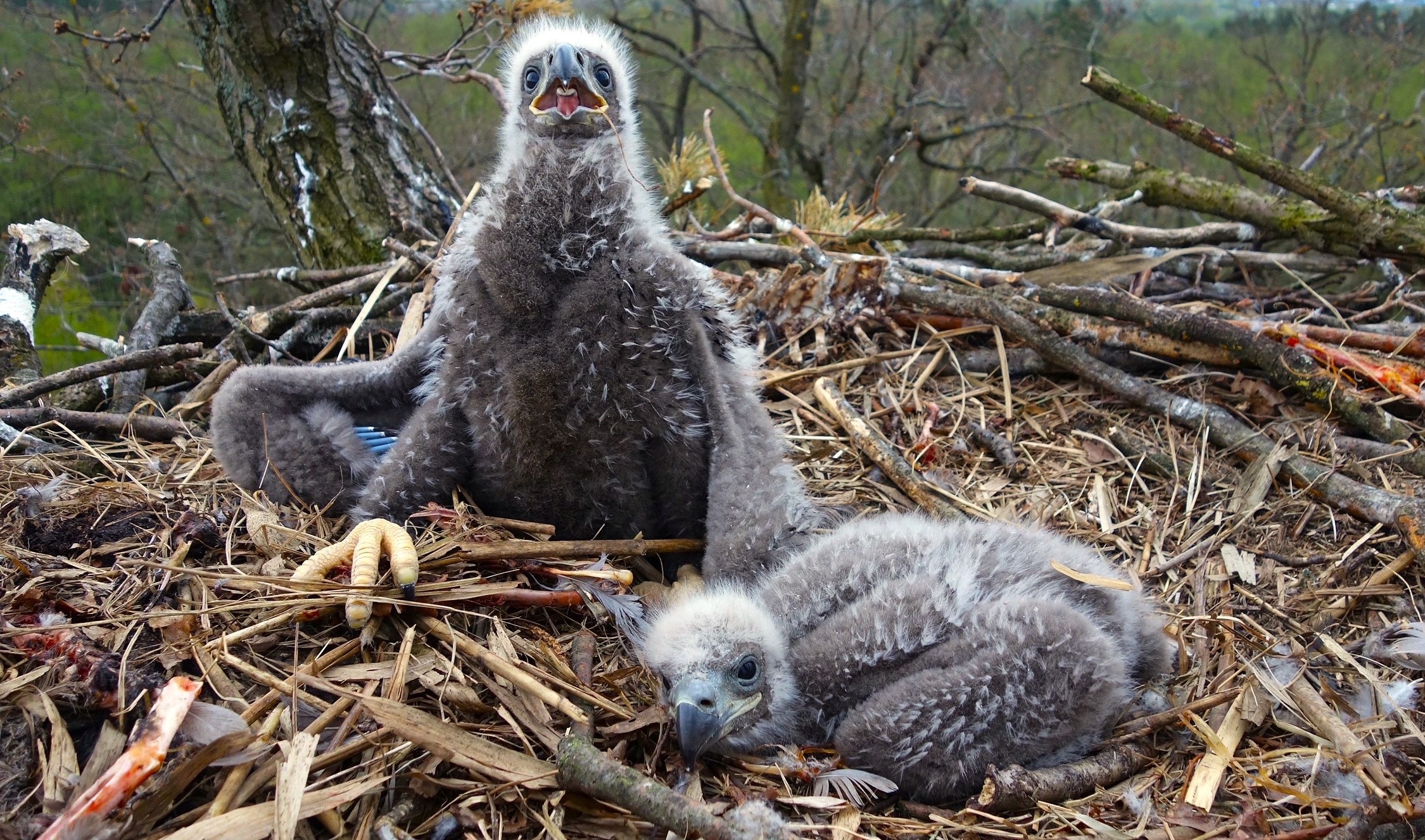
Species conservation is the part of nature conservation that deals with the protection of populations of individual species or the protection of entire habitats. This is important as the destruction of the habitat would also result in the disappearance of the species.
The Lower Nature Conservation Authority is sometimes responsible for ensuring that the relevant regulations on species protection, in particular those of the Federal Nature Conservation Act, are complied with in the urban area. The nature conservation authority is not only responsible for protected national or native species, but also for introduced, internationally protected species (see "International species protection").
The aim and task of species protection is the conservation of legally protected animal and plant species, as well as the protection of their habitats and biotopes. Any action that leads to impairment, disturbance or destruction of the aforementioned protected species is prohibited.
Exemption from these prohibitions may be granted by the Lower Nature Conservation Authority on application if there are appropriate grounds.
More information
You can find the relevant legal texts under the following links
-
Beaver
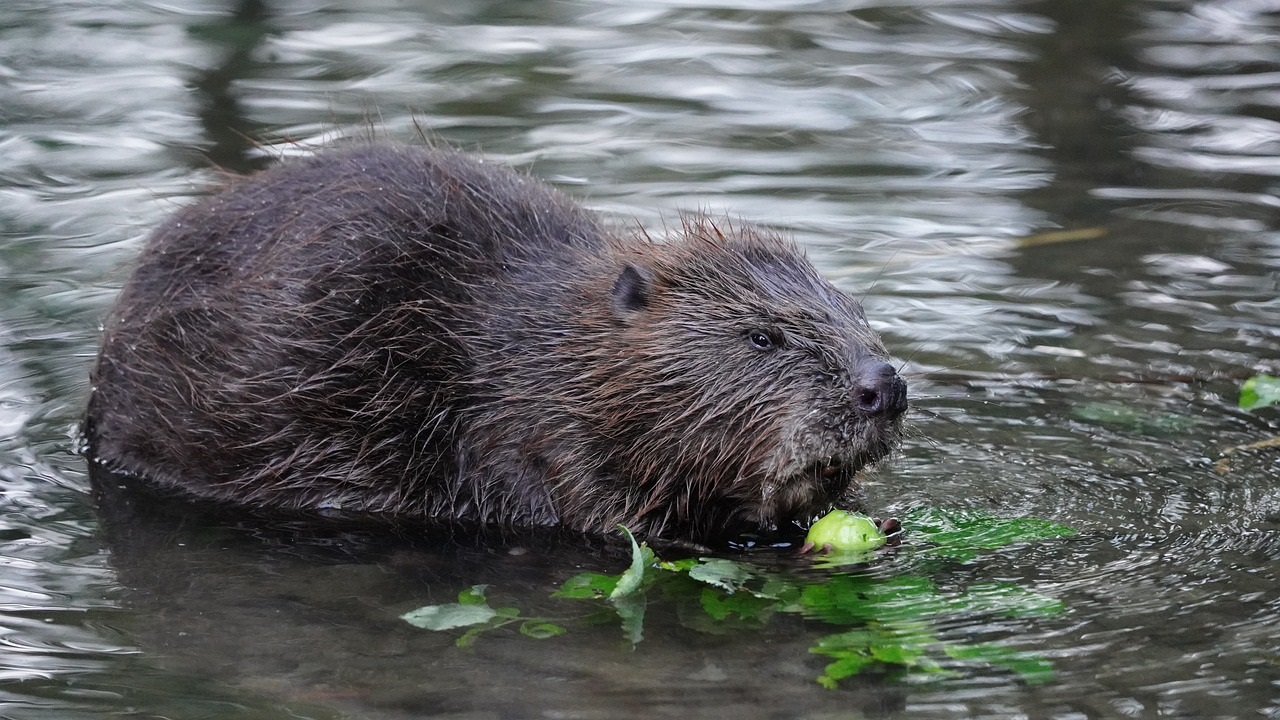 Beavers have rather small ears that almost disappear in their thick fur. Their whiskers are dark and therefore difficult to recognize, whereas in nutria they stand out more clearly due to their white colouring.Photo: pixabay.com
Beavers have rather small ears that almost disappear in their thick fur. Their whiskers are dark and therefore difficult to recognize, whereas in nutria they stand out more clearly due to their white colouring.Photo: pixabay.comThe European beaver (Castor fiber) is a native wild animal species whose population was reduced to small remnant populations, including along the middle Elbe, by intensive hunting until the 20th century. Thanks to species protection measures, the population in Germany has grown to over 50,000 animals in recent decades. Coming from the Elbe, beavers have also returned to the city of Wolfsburg via the Drömling.
Beavers are listed in Annex IV of the European Union's Habitats Directive (Directive 92/43/EEC) and are therefore a specially and strictly protected species in Germany in accordance with Section 7 Paragraph 2 No. 14 of the Federal Nature Conservation Act (BNatSchG). Beavers are also an animal species of Community interest for whose conservation protected areas must be designated.
Due to their territorial way of life and the construction of dams, the animals are able to actively regulate the water level of the bodies of water within the territories they use. The damming of water and the felling of trees creates new, ecologically valuable habitats for plants and animals. The natural habitats created in this way are dynamic: over the years, beaver dams are repeatedly relocated, decay and become more permeable. Through its constant and changing construction activity, the beaver creates structural richness along small watercourses and in the adjacent floodplains, thereby promoting biodiversity. Its outstanding role as a landscape designer and target species for natural watercourse development is extremely important for humans and the environment, especially in times of increasing droughts. The long-term effects of beaver activities can also mitigate the negative consequences of climate change (long periods of drought, more frequent heavy rainfall events).
However, the landscaping activities of beavers can also lead to various conflicts, especially in urban areas. Most conflicts arise from beaver dams and subsequent waterlogging or flooding.
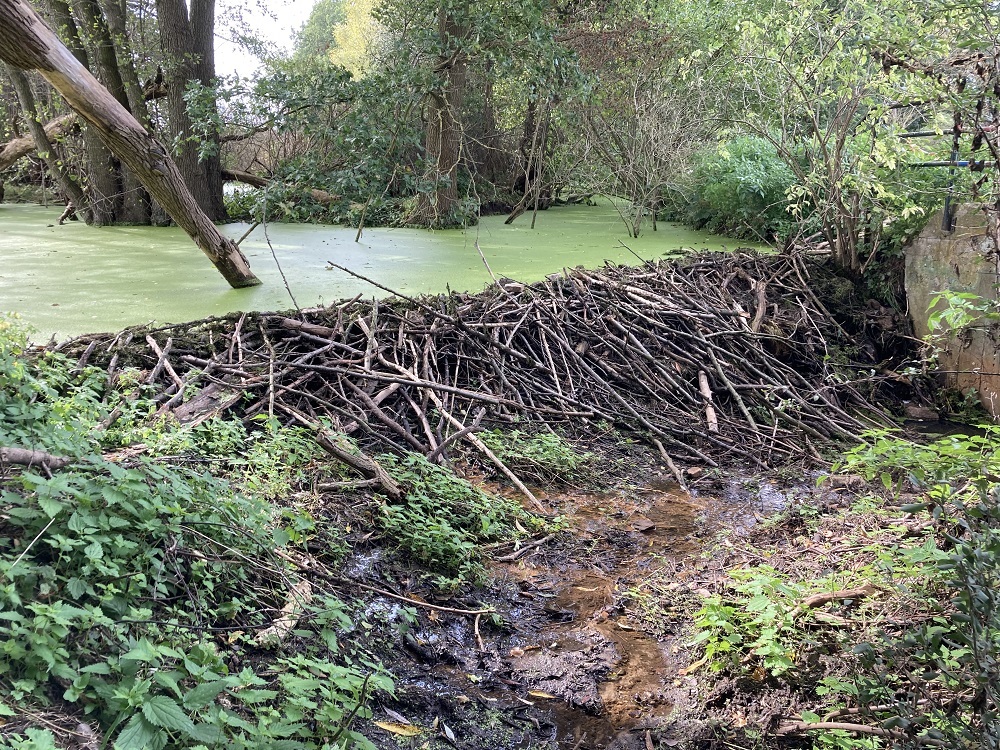 With their dams, beavers are able to raise the water level and thus prevent runoffPhoto: Lower Nature Conservation Authority Wolfsburg
With their dams, beavers are able to raise the water level and thus prevent runoffPhoto: Lower Nature Conservation Authority WolfsburgAs a strictly protected species, beavers and their structures and dams enjoy special protection under the provisions of Section 44 of the Federal Nature Conservation Act (BNatSchG). According to Section 44 (1) BNatSchG, it is prohibited in particular to stalk, capture, injure or kill beavers, to significantly disturb them during the particularly sensitive phases of reproduction and rearing or to damage or destroy their breeding and resting places (dens/castles and dams).
If you discover a dead or injured beaver or have problems/concerns due to beaver activities (e.g. flooding of roads or private property), please contact the Lower Nature Conservation Authority immediately.
-
Wolf
Wild wolves have been living in Germany again since 2000, having immigrated from Poland. Wolves have also been native to Lower Saxony again since 2011. It has been known since July 2024 that a pack of wolves has also settled in the city of Wolfsburg.
-
Hornets/wasps
A familiar phenomenon - small, black and yellow flying insects that turn up unannounced at coffee and cake parties or barbecues in the garden and are sometimes very intrusive and sometimes even defensive. As a rule, these are wasps, which cause citizens great concern every year and lead to questions about what they can do about the "pests" and who can advise or help them.
Hornets, bumblebees and wild bees as well as some species of earth and leaf wasps are specially protected due to their rarity. The nests of these species may only be removed with a special permit or exemption from the Lower Nature Conservation Authority. Priority must always be given to leaving the nest in place. If there are grounds for exemption or exception, relocation or removal of the animals and the nest may be considered.
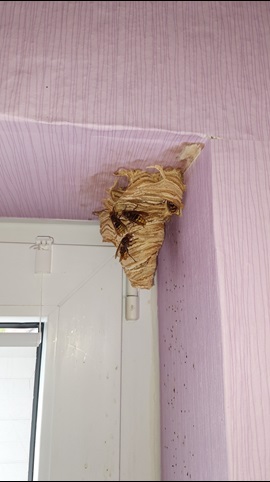

Hornet's nest in roller shutter box and living room (Photo: N. Behrens) The individual species can usually only be distinguished by experts. The city of Wolfsburg offers free advice from the city's wasp and hornet officer (see below for contact details). The necessity or practical possibility of relocation or removal can then be discussed on site.
Please note: The necessary special permit/exemption from the Lower Nature Conservation Authority is subject to a fee. The relocation or removal must be carried out by a specialist, who is commissioned by the applicant.
Wasp and hornet officer of the city of Wolfsburg
Norbert Behrens
E-mail: nobehns@web.de
Telephone: 0151-14039548
-
International species protection
The field of international species conservation covers the control of trade in wild animals and plants in order to ensure their survival in the wild.
 Greek tortoises are endangered, which is why they are a strictly protected species. Taking them from the wild is strictly prohibited, only the trade in captive-bred specimens is permitted (proof must be provided)Photo: Lower Nature Conservation Authority Wolfsburg
Greek tortoises are endangered, which is why they are a strictly protected species. Taking them from the wild is strictly prohibited, only the trade in captive-bred specimens is permitted (proof must be provided)Photo: Lower Nature Conservation Authority WolfsburgThe field of international species conservation encompasses the control of trade in wild animals and plants in order to ensure their survival in the wild. The uncontrolled global trade in captured wild animals and collected wild plants has led to many species becoming highly endangered or even threatened with extinction. As a result, the Washington Convention on International Trade in Endangered Species of Wild Fauna and Flora (CITES) was adopted in 1973, which defines the control of international trade in endangered animal and plant species through documentation and licensing requirements as well as trade restrictions. Within the European Union, the Convention is implemented by EC Regulation 338/97. This is supplemented by the provisions of the Federal Nature Conservation Act and the Federal Species Protection Ordinance.
In addition to the Lower Saxony State Agency for Water Management, Coastal Defence and Nature Conservation (NLWKN), the lower nature conservation authorities are responsible for enforcing the international species protection regulations.
The legally required animal population reports on the keeping of specially protected vertebrates are recorded centrally by the NLWKN in Lower Saxony. The state also grants exceptions and exemptions from marketing bans and identification requirements.
The lower nature conservation authorities are responsible, among other things, for seizing and confiscating specially protected animals and plants that are kept illegally or without the necessary certificates, as well as initiating criminal or administrative offense proceedings in the event of violations.
-
Species/nature conservation officer
Barn owl representative of the city of Wolfsburg
Rita Lunde
E-mail: schleiereulen@mail.de
Phone: 0157 31635521
As the barn owl officer, Rita Lunde looks after the barn owls living in the city of Wolfsburg and their breeding and nesting boxes. In addition to ringing young birds and caring for injured animals, Ms. Lunde advises all interested parties on this strictly protected owl species, builds nesting boxes, places them in suitable locations, maintains them and checks them annually for breeding success. Through her work, important data is collected on the population, age of the animals and breeding success, among other things, which is made available to both the Lower Nature Conservation Authority of the city of Wolfsburg and the bird protection authority of the state of Lower Saxony. Ms. Lunde is available to all interested parties as a contact person on the subject of barn owls. You can find more information about the barn owls on the following website: <a rel="noopener noreferrer" href="https://www.hilfe-fuer-schleiereulen.de/neues/index.html" target="_blank" title="Zur Seite "Hilde für Schleiereulen (opens in a new window)">www.hilfe-fuer-schleiereulen.de</a> </p> <p> </p>
White stork representative of the city of Wolfsburg
Georg Fiedler
E-Mail: fiedler.storchenwelt@t-online.de
Phone: 03942 686368
Georg Fiedler is the white stork officer responsible for the white storks breeding in Wolfsburg and their nests, also known as eyries. In addition to ringing young birds, providing acute care for injured animals and checking and repairing the nests, Mr. Fiedler advises both the Lower Nature Conservation Authority and all other interested parties on the lifestyle, requirements and treatment of white storks. Through his work, important data is collected on the population, age of the animals and breeding success, among other things, which is made available to both the Lower Nature Conservation Authority of the City of Wolfsburg and the Bird Protection Office of the State of Lower Saxony.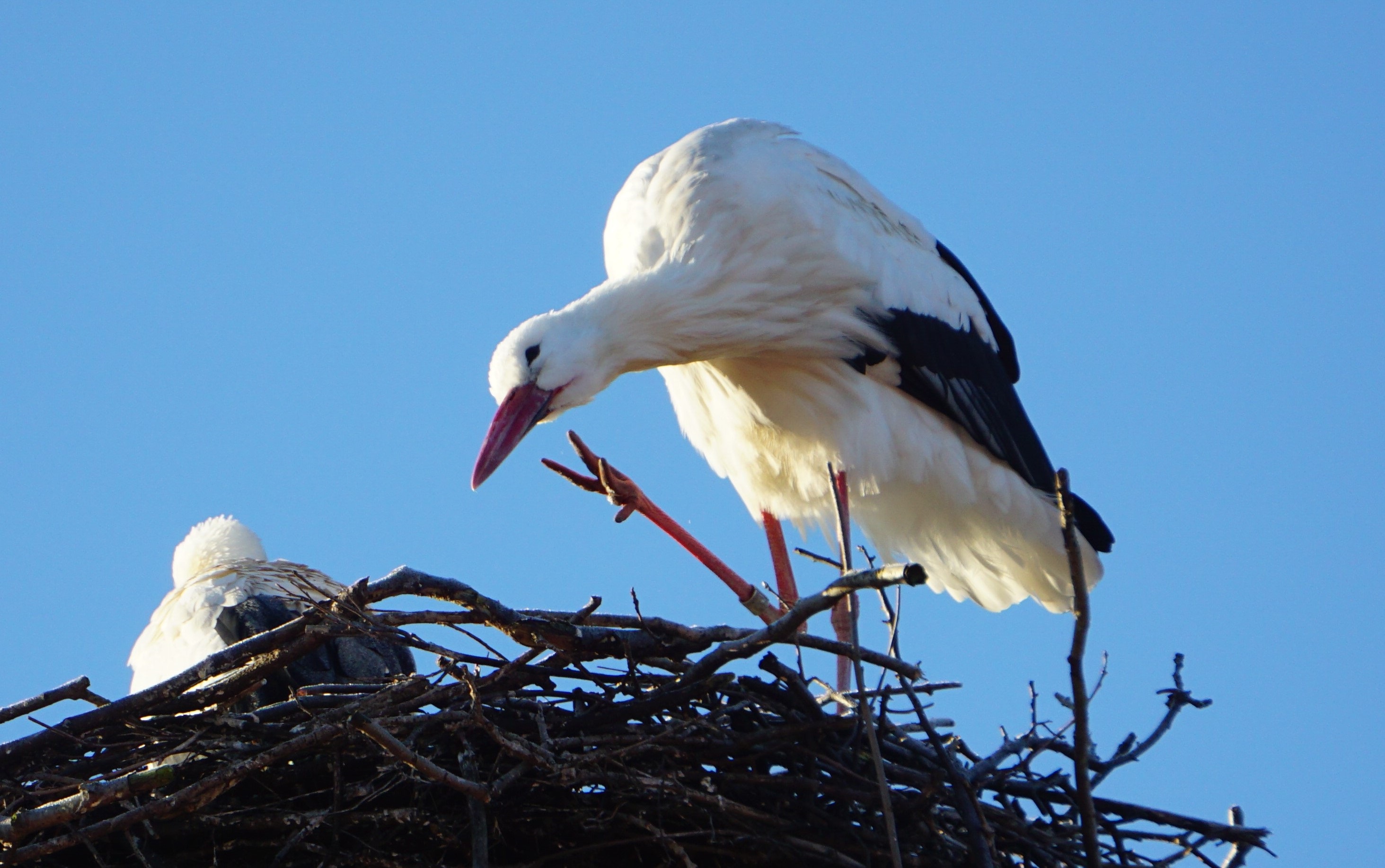 White stork in the nestPhoto: Lower Nature Conservation Authority Wolfsburg
White stork in the nestPhoto: Lower Nature Conservation Authority WolfsburgWasp and hornet officer
Norbert Behrens
E-Mail: nobehns@web.de
Phone: 0151-14039548Wasps, such as the common or German wasp, but also hornets, can settle unnoticed in the immediate vicinity of humans and thus cause problems for various reasons. It should be noted that hornets and some other wasp species are specially protected due to their rarity and the nests may therefore only be relocated or removed with a special permit from the Lower Nature Conservation Authority. The priority is always to leave the nest in place. If there are grounds for exemption or exception, relocation or removal of the animals and the nest may be considered. As a rule, the individual species can only be distinguished by experts. The city of Wolfsburg offers free advice from the wasp and hornet officer Norbert Behrens. During an on-site appointment, Mr. Behrens determines the species, gets an idea of the exact situation and the need for action as well as the options for action. The high level of expertise and professional advice provided by Mr. Behrens enables the Lower Nature Conservation Authority to make a quick decision on the application for a special permit/exemption depending on the situation. If you have any questions on the subject of bees and wasps, please contact Mr. Behrens.
Nature conservation officer
Michael Kühn
E-Mail: mkuehn3@gmx.de
Telephone: 05363 805 655According to Section 34 of the Lower Saxony Nature Conservation Act (NNatSchG), the nature conservation authority can appoint representatives for nature conservation and landscape management. The person is appointed for a period of five years. The honorary nature conservation officer advises and supports the nature conservation authority in all matters relating to nature conservation and landscape management and promotes general understanding of this task. The appointed person is therefore the link between the nature conservation authority and the citizens, is independent and is not bound by professional instructions.
Michael Kühn is the nature conservation officer for the city of Wolfsburg. He has worked for NABU Wolfsburg for decades in voluntary nature conservation, has the necessary expertise and is an important advisor on nature conservation issues in council committees and public meetings. If you have any questions about nature conservation in general or specifically about nature conservation issues in the city of Wolfsburg, please do not hesitate to contact Mr. Kühn.